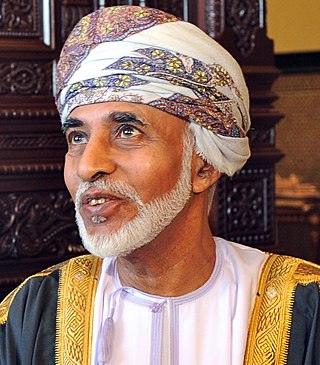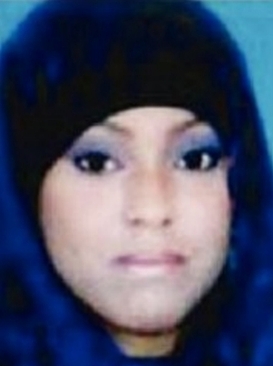
Oman, officially the Sultanate of Oman, is an Arab country located in Western Asia. It is situated on the southeastern coast of the Arabian Peninsula, and spans the mouth of the Persian Gulf. Oman shares land borders with Saudi Arabia, the United Arab Emirates, and Yemen, while sharing maritime borders with Iran and Pakistan. The coast is formed by the Arabian Sea on the southeast, and the Gulf of Oman on the northeast. The Madha and Musandam exclaves are surrounded by the United Arab Emirates on their land borders, with the Strait of Hormuz and the Gulf of Oman forming Musandam's coastal boundaries. Muscat is the nation's capital and largest city.

Muscat is the capital and most populated city in Oman. It is the seat of the Governorate of Muscat. According to the National Centre for Statistics and Information (NCSI), the total population of Muscat Governorate was 1.4 million as of September 2018. The metropolitan area spans approximately 3,500 km2 (1,400 sq mi) and includes six provinces called wilayats. Known since the early 1st century AD as an important trading port between the west and the east, Muscat was ruled by various indigenous tribes as well as foreign powers such as the Persians, the Portuguese Empire and the Ottoman Empire at various points in its history. A regional military power in the 18th century, Muscat's influence extended as far as East Africa and Zanzibar. As an important port-town in the Gulf of Oman, Muscat attracted foreign tradesmen and settlers such as the Persians, Balochis and Sindhis. Since the ascension of Qaboos bin Said as Sultan of Oman in 1970, Muscat has experienced rapid infrastructural development that has led to the growth of a vibrant economy and a multi-ethnic society. Muscat is termed as a Beta - Global City by the Globalization and World Cities Research Network.

Qaboos bin Said Al Said was Sultan of Oman from 23 July 1970 until his death in 2020. A fifteenth-generation descendant of the founder of the House of Al Said, he was the longest-serving leader in the Middle East and Arab world at the time of his death, having ruled for almost half a century.

The Ibadi movement or Ibadism is a school of Islam. The followers of Ibadism are known as the Ibadis.
The music of Oman has been strongly affected by the country's coastal location, with Omani sailors interacting with, and bringing back music from, Egypt, Tanzania and elsewhere. More recently, a Portuguese occupation has left its own marks, while geographic neighbors like the United Arab Emirates, Yemen, Saudi Arabia and Iran have also had a profound influence. In contrast to other Arab countries, Omani traditional music has a strong emphasis on rhythm.

Sayyid Saïd bin Sultan al-Busaidi, was Sultan of Muscat and Oman, the fifth ruler of the Busaid dynasty from 1804 to 4 June 1856. His rule commenced following the death of his father, Sultan bin Ahmad, in November 1804 and a period of conflict and internecine rivalry of succession that followed. He is often referred to as the Lion of Oman, as one of the greatest Omani sultans. Said's uncle Qais bin Ahmad finally agreed to Said's primacy following Said's killing of his cousin, Badar bin Saif, a pretender to the throne. He is noted for having moved his capital to Zanzibar, during which time the Omani Empire reached the zenith of its power and wealth.
Oman Air is the national airline of the Sultanate of Oman. Based at Muscat International Airport in Seeb, Muscat, it operates domestic and international passenger services, as well as regional air taxi and charter flights.

Al-Seeb, As Seeb or As Sib is a coastal fishing city, located several kilometres northwest of Muscat, in northeastern Oman. As of the 2020 census, it had a population of 470,878.
The Education in Oman is provided free of charge up to end of secondary education, though attendance is not mandatory at any level. In 1970 there were only three formal schools with 900 students in the whole state. Oman's national educational program expanded rapidly during the 1970s and the 1980s. In 2006–2007 about 560,000 students attended 1053 public schools. The number of students in private schools is about 65,000. There are also extensive programmes to combat adult illiteracy. Sultan Qaboos University, the only national university near Muscat, was founded in 1986, and in 2006 it had 13,500 students. The Human Development Report found the literacy rate to be 93.0% in adults, up from 54.7% in 1990. For the same period, the youth literacy rate increased from 85.6 to 97.3%. Public expenditure on education was reported to be 4.6% of GDP and 26.1% of total government spending.
Nasra is a census town in the Ranaghat II CD block in the Ranaghat subdivision of the Nadia district in the Indian state of West Bengal.
The Sharqiya Sands is a region of desert in Oman, The region was named for the Bani Wahiba tribe. Divided between the northern and southern governorates in the Eastern Region. The area is defined by a boundary of 180 kilometers (110 mi) north to south and 80 kilometers (50 mi) east to west, with an area of 12,500 square kilometers (4,800 sq mi). The desert has been of scientific interest since a 1986 expedition by the Royal Geographical Society documented the diversity of the terrain, the flora and fauna, noting 16,000 invertebrates as well as 200 species of other wildlife, including avifauna. They also documented 150 species of native flora.

The 2009 Kuwait wedding fire was an arson attack that occurred during a wedding ceremony in Oyoun, Jahra Governorate, Kuwait on 15 August 2009. At least 57 people were killed and about 90 others wounded when the groom's 23-year-old first wife, Nasra Yussef Mohammad al-Enezi, to take revenge for her husband taking a second wife, poured petrol on a tent where women and children were celebrating and set it on fire. Within three minutes the whole tent, which had only one exit and did not meet fire safety regulations, was engulfed in flames, trapping many inside. It was the deadliest civilian disaster in Kuwait in the last 40 years. Many of the bodies were burnt beyond recognition and had to be identified from DNA and dental records. It had been claimed that the temperature inside the tent was above 500 degrees Celsius.

The United Arab Emirates has an embassy in London while the United Kingdom maintains an embassy in Abu Dhabi and is unique in having another Embassy in Dubai, albeit with Her Britannic Majesty's Consul-General to Dubai and the Northern Emirates, as opposed to a separate British Ambassador. The UAE-UK relations have been described as a "special relationship".
Jokha Alharthi also spelt al-Harthi, is an Omani writer and academic, known for winning the Man Booker International Prize in 2019 for her novel Sayyidat al-Qamar, published in English under the title Celestial Bodies. She has written four novels in Arabic, two of which have been translated into English.
Al-Nasirah is a small Christian town in northwestern Syria, administratively part of the Homs Governorate, located west of Homs and just north of the border with Lebanon. Nearby localities include Habnamrah to the northwest, Marmarita and Ayn al-Bardah to the west, Zweitina to the southwest, al-Husn to the south, al-Huwash and al-Mazinah to the southeast, Shin to the east, Muqlus to the northeast, Hadeih and Mashta al-Helu to the north. According to the Syria Central Bureau of Statistics (CBS), al-Nasirah had a population of 835 in the 2004 census. It is the administrative center of the al-Nasirah nahiyah ("subdistrict") which consisted of 20 localities with a collective population of 16,678 in 2004. The subdistrict largely occupies an area known as Wadi al-Nasara The inhabitants of the town are predominantly Greek Orthodox Christians. The village has a Greek Orthodox Church.

The Voice of the People of Tunisia is a Tunisian political party, founded in June 2014 by Larbi Nasra, a media entrepreneur, founder and former owner of Hannibal TV station and in-law of former President Zine El Abidine Ben Ali. The name is a reference to the advertising slogan of Nasra's TV station. The party's 6 members in the Constituent Assembly had defected from other parties. Larbi Nasra is the party's candidate in the 2014 presidential election.

Oman competed at the 2016 Summer Olympics in Rio de Janeiro, Brazil, when the event was held from 5 to 21 August 2016. This was the nation's ninth consecutive appearance at the Summer Olympics. Four Omani athletes, two men and two women, were selected to compete in athletics and shooting at the Games. Among them were sprinter Barakat Al-Harthi, the lone returning Olympian from the previous Games.
Nasra, Idlib is a Syrian village located in Al-Janudiyah Nahiyah in Jisr al-Shughur District, Idlib. According to the Syria Central Bureau of Statistics (CBS), Nasra, Idlib had a population of 128 in the 2004 census.
Nura 'Abd Allah al-Badi is an Omani poet.
Huda Hamed is an Omani writer and journalist born in 1981. She has published five collections of short stories and four novels. In 2009, her short story collection Things Are Not Where They Should Be won the Sharjah Award for Arab Creativity and Best Omani Publication.








